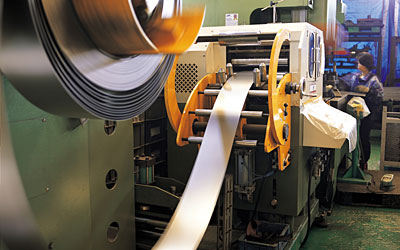
The JPMorgan Global Manufacturing PMI - a composite indicator produced by JPMorgan and NTC in association with ISM and IFPMM and designed to provide an overall view of global manufacturing conditions - rose for the fifth month running in September. At 52.3, up from 52.0 in August, the PMI has signalled an expansion of the manufacturing sector for three consecutive months (following five months of decline). The rate of increase in September was the fastest since June 2002.
The Global Manufacturing PMI is based on responses from approximately 7,000 companies worldwide, operating in countries that account for roughly 76% of total global manufacturing output.
"The global PMI is signaling a sharp acceleration in manufacturing activity. The strength of production and new orders is particularly impressive. The remaining impediments to a sustained manufacturing recovery are employment and inventories, which were weak again in September. However, JPMorgan expects some improvement in these key indicators in coming months," said David Hensley, director of global economics coordination at JPMorgan.
The latest PMI reading reflected a further significant expansion of output and stronger growth of new orders. At 54.6, the Global Manufacturing Output Index registered an increase in production for the fourth month running. The rate of increase slipped from August's fourteen-month peak but remained high by recent survey standards.
The Global Manufacturing New Orders Index continued to rise, increasing from 54.8 in August to 56.3. New orders have now risen for three successive months, with the rate of growth accelerating over this period to reach a fifteen-month peak in September. The increased buoyancy of new orders suggests that growth of production may strengthen in future months.
At 47.5, the Global Manufacturing Employment Index signalled a drop in staffing levels for the thirty-fourth straight month. Moreover, having eased over the previous five months, the rate of job losses picked up slightly in September as manufacturers continued to focus on boosting productivity in the face of strong competition.
The Global Manufacturing Input Prices Index rose from 49.5 in August to 51.3 in September, moving above the 50.0 no-change level to indicate the first increase in average raw material prices for three months. Although only modest, the rate of increase was the strongest since April, when the rate of inflation was driven up by higher oil prices during the Iraq war.
The Global Report on Manufacturing is based on the results of surveys carried out in the USA by ISM, in Japan, the UK, Germany, France, Spain, Italy, Russia, Ireland, Greece, Austria, the Netherlands, Poland and Czech Republic by NTC Research and in a number of other countries: Denmark, Israel, Hungary, South Africa, Switzerland, Australia and Singapore. These countries together account for an estimated 76% of global manufacturing output.
The Global Report on Manufacturing provides the first indication each month of global manufacturing business conditions, based on data collected from around 7,000 purchasing executives. It is compiled by NTC Research. The data enable decision makers in the financial world and in government to make better judgments much earlier than would otherwise be the case.
The wide coverage of the indexes, together with their speed of production, accuracy and direct comparability, make them unmatched as economic indicators. They provide truly "must have" information for financial institutions of all kinds and for major corporations world-wide. Questions are asked about real events and are not opinion based. Data are presented in the form of diffusion indices, where an index reading above 50.0 indicates an increase in the variable since the previous month and below 50.0 a decrease.